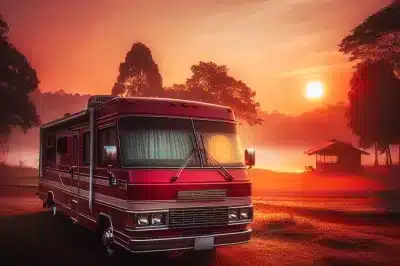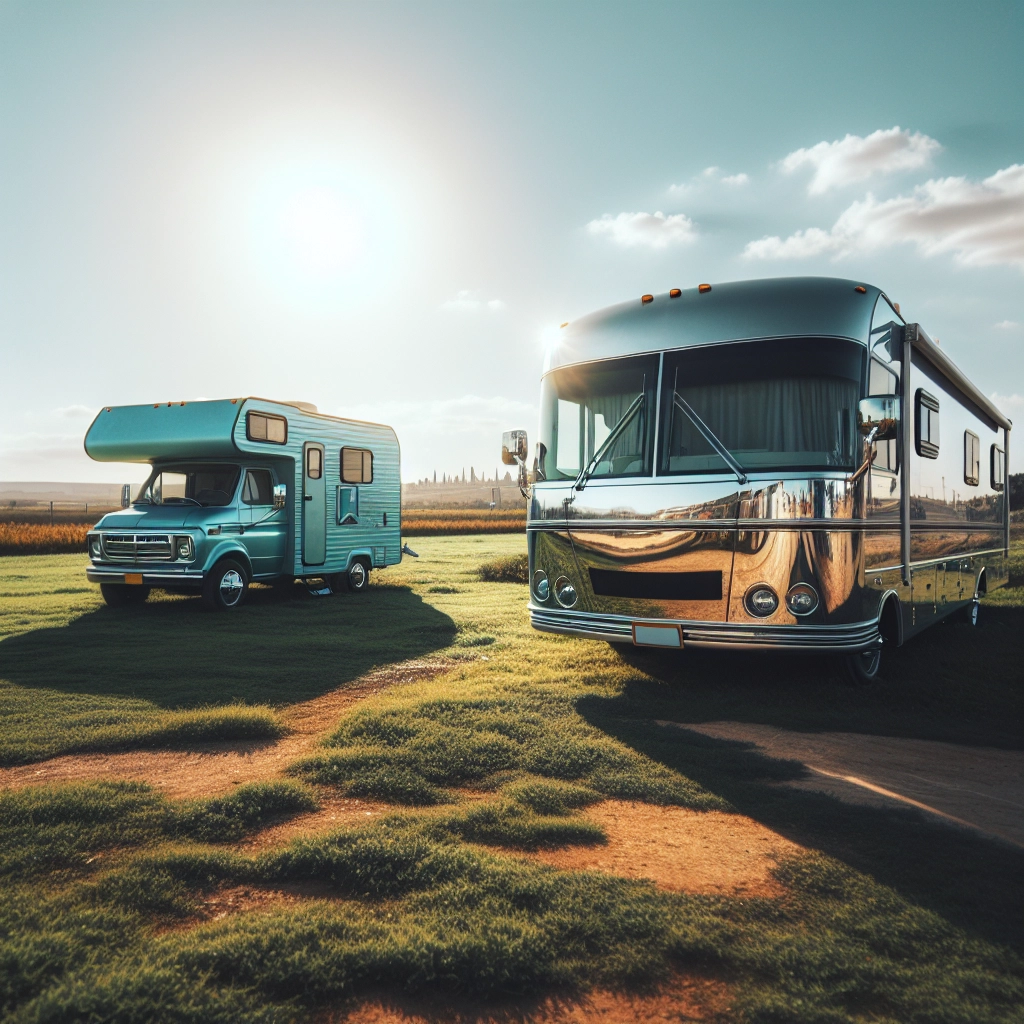Table of Contents

Shine On: The Ultimate Guide to RV Boondocking Solar Panels
Imagine the freedom of traveling without the need for hookups, the quiet solitude of nature, and the peace of mind that comes with sustainable energy. This isn’t just a dream—it’s the reality for those who choose solar power for their RV boondocking adventures. With the right solar panels, the great outdoors becomes your comfortable, eco-friendly home away from home.
Key Takeaways: Harnessing Solar Power for Off-grid Adventures
- Understand how solar power can revolutionize your boondocking experience.
- Discover the top solar panels that offer the best performance for off-grid RVing.
- Learn about the benefits of solar energy for remote RV living.
- Gain insights into assessing your RV’s solar power needs and capacity.
- Get the scoop on the latest solar panel reviews from real-world boondockers.
Why Solar Power is a Game-Changer for Boondocking
Boondocking, or dry camping, is all about freedom and self-sufficiency. Solar power is the key that unlocks this lifestyle. By harnessing the sun’s energy, you can light up your RV, charge your devices, and run small appliances without ever needing to plug into the grid. It’s not just about saving money on campground fees—it’s about the independence to explore and stay anywhere the sun shines.
The Benefits of Solar Energy in Remote RVing
When you’re miles away from the nearest power outlet, solar energy becomes your best friend. It’s clean, quiet, and abundant. Here are some of the top benefits:
- Environmental Friendliness: Solar power is green, reducing your carbon footprint and helping preserve the beautiful places you visit.
- Cost Savings: After the initial setup, the sun’s energy is free, which means more money in your pocket for adventures.
- Quiet Operation: Unlike noisy generators, solar panels work silently, maintaining the serenity of your natural surroundings.
- Low Maintenance: Solar panels require minimal upkeep, giving you more time to enjoy your travels.
- Energy Independence: With a well-designed solar setup, you can stay off-grid for extended periods, free from the constraints of fixed power sources.
Understanding Solar Power Capacity and RV Needs
Before diving into the world of RV solar panels, it’s crucial to understand your energy needs. How much power do you use daily? What appliances are essential for your comfort? These questions will guide you in selecting a solar system that can handle your consumption. Remember, it’s not just about the wattage—it’s about matching your lifestyle with the right capacity for continuous, reliable power.
Best Solar Panels for Boondocking Rigs
With so many solar panels on the market, it can be overwhelming to choose the best fit for your RV. That’s why we’ve done the homework for you, sifting through countless options to find the panels that stand out for their quality, efficiency, and value. Whether you’re a weekend warrior or a full-time nomad, these top picks will keep your adventures bright.
Renogy Rigid Solar Panel: Power and Durability
When it comes to balancing power and durability, the Renogy Rigid Solar Panel is a standout performer. Built to withstand the rigors of the road and the unpredictability of nature, these panels are designed for those who demand reliability. With high-efficiency cells, they ensure that even on days when sunlight is limited, you’re maximizing energy capture. They’re a solid investment for the long-term boondocker who doesn’t want to compromise on quality.
Zamp Solar Legacy Series: A Premium Choice
Zamp Solar Legacy Series takes premium to the next level with its superior build and exceptional performance. These panels are for the discerning traveler who wants the best of the best. Crafted with the highest-grade materials, they offer an unmatched conversion efficiency, ensuring that your RV gets more power from every ray of sunshine. They come at a higher price point, but the boost in performance and the longevity they offer make them worth every penny.
WindyNation 100 Watt Solar Panel Kit: Budget-Friendly Efficiency
For those who are just dipping their toes into solar power or are mindful of their budget, the WindyNation 100 Watt Solar Panel Kit is a fantastic choice. It strikes an excellent balance between affordability and efficiency, providing enough power for basic needs without breaking the bank. This kit is also great for beginners, as it includes all the components you need for a straightforward setup, making the transition to solar as smooth as possible.

Key Features to Look for in Solar Panels
Selecting the right solar panels for your RV is more than just picking the highest wattage. You need to consider a variety of features that will impact performance, longevity, and ease of use. Let’s break down what you should keep an eye out for to ensure you’re making the best choice for your off-grid power needs.
Assessing Solar Panel Wattage for Your RV
Wattage is like the horsepower of solar panels—it tells you how much power they can produce in ideal conditions. But bigger isn’t always better. You need to match the wattage to your energy usage. Start by calculating your daily power consumption. From there, you can determine how many watts your solar panels need to generate to keep everything running smoothly. It’s all about finding that sweet spot between your energy needs and what the panels can provide.
The Importance of Solar Panel Durability When Boondocking
Out in the wild, your solar panels will face everything from scorching sun to hail storms. Durability is key. Look for panels with sturdy frames, tempered glass, and weather-resistant materials. They should be able to take a beating and keep on charging. Remember, the more durable the panels, the less you’ll worry about them when you’re out exploring the great outdoors.
Compatibility and Installation Ease
Choosing solar panels that mesh well with your RV’s existing system and are easy to install can save you a lot of headaches. Look for panels with pre-drilled holes for mounting and connectors that match your RV’s power system. Consider whether you’ll need additional tools or equipment for installation. Ease of installation is not just a convenience; it’s a way to ensure you can get your system up and running quickly and efficiently, without extra costs or delays.
Setting Up Your Solar Power System
Setting up your solar power system is a pivotal step towards energy independence. It involves selecting the right components, such as solar panels, charge controllers, batteries, and inverters, and integrating them into a cohesive unit that powers your RV. The goal is to create a system that’s robust, efficient, and tailored to your energy needs, ensuring you have a reliable source of power wherever your travels take you.
Step-by-step Guide to Installing RV Solar Panels
- Plan Your System: Determine the size and number of panels you’ll need based on your energy consumption.
- Gather Tools and Materials: Make sure you have all necessary components, including mounting brackets, wiring, and safety equipment.
- Mount the Panels: Secure the solar panels to your RV’s roof, ensuring they’re positioned for maximum sun exposure.
- Wire the Panels: Connect the panels to the charge controller, which regulates the power going to your batteries.
- Connect the Batteries: Wire your batteries to the charge controller, then to the inverter, which converts DC power to AC for your appliances.
- Test the System: Check all connections, turn on the system, and monitor the initial performance to ensure everything is working correctly.
Remember, safety first! If you’re not comfortable with electrical systems, it’s best to hire a professional.
Optimizing Solar Panel Placement for Maximum Efficiency
The placement of your solar panels can make a significant difference in their efficiency. Aim to mount them where they can receive direct sunlight with minimal shading throughout the day. Consider the path of the sun and any potential obstructions like trees or other structures. Tilt mounts can be a great investment, as they allow you to adjust the angle of your panels to follow the sun, maximizing energy absorption.
Real-World Reviews: Boondockers Share Their Solar Experiences
There’s no substitute for real-world experiences. Hearing from fellow boondockers who’ve made the switch to solar can provide valuable insights and inspiration. They’ve been where you are now, made the decisions, faced the challenges, and reaped the rewards of solar power. Their stories are a goldmine of practical advice and honest feedback on the solar panels and systems they’ve used.
Case Studies: Off-grid Living with Solar Power
“We’ve been living off-grid in our RV for over a year, and our solar setup has been a game-changer. We chose high-efficiency panels that fit our roof perfectly, and the difference in our power supply is night and day. We can stay in remote locations for weeks without worrying about running out of power. It’s given us the freedom we always wanted.” – Sam and Alex, Full-time RVers
Stories like Sam and Alex’s are not uncommon. Many boondockers find that a well-planned solar system can support their lifestyle indefinitely, allowing them to live and travel with a sense of self-reliance that’s both liberating and sustainable.
Boondocking Solar Panel Testimonials
“I never thought I’d be able to run my coffee maker and laptop off-grid, but my solar setup has made it possible. Mornings in the wilderness have never been better.” – Jenna, Weekend Boondocker
Testimonials like Jenna’s highlight the personal impact that solar power can have on the boondocking experience. It’s not just about the technical specs; it’s about the lifestyle that solar energy enables. Stories from the road often mention the joy of uninterrupted power and the ability to enjoy modern comforts in the most remote of settings.

Maximizing Solar Power Usage While Boondocking
Getting the most out of your solar panels means being smart about how you use power. It’s about balancing your energy generation with your consumption, ensuring that you have enough power for your needs without wasting any. This balance is key to a successful off-grid experience.
Tips for Energy Conservation in Your RV
- LED Lighting: Swap out all bulbs for LED lights, which use a fraction of the power of traditional bulbs.
- Energy-Efficient Appliances: Invest in appliances designed for low power consumption, especially those labeled as ‘energy star’ rated.
- Monitor Usage: Keep an eye on your energy consumption with a power monitor to identify where you can cut back.
- Unplug: Even when off, many devices draw power. Unplug them when not in use to prevent unnecessary drain.
- Smart Charging: Charge devices during the day when your panels are generating power, rather than at night.
- Insulation: Properly insulate your RV to maintain temperature, reducing the need for heating and cooling.
- Timed Use: Run high-power appliances like washing machines during peak sunlight hours.
By implementing these strategies, you can extend the duration of your off-grid adventures and reduce the need for supplementary power sources.
Must-Have Solar Accessories for Efficient Energy Management
- Charge Controllers: Protect your batteries from overcharging with a high-quality charge controller.
- Battery Monitors: Keep track of your battery’s health and charge level to prevent deep discharges.
- Inverters: Convert DC power from your panels to AC power for everyday use with a reliable inverter.
- Solar Blankets: Portable and foldable, solar blankets can provide extra power when needed.
- Mounting Hardware: Ensure your panels are secure and optimally angled with the right mounting accessories.
- Connectors and Cables: Use high-quality cables and connectors to minimize power loss.
With these accessories, you can optimize your solar power system for peak performance and reliability, ensuring that you have power when and where you need it.
Conclusion: Illuminating Your Way to Solar Self-Sufficiency
Embracing solar power for your RV boondocking adventures is more than a trend—it’s a lifestyle choice that offers freedom, sustainability, and a connection with nature. With the right solar panels and a mindful approach to energy use, the dream of off-grid living is well within reach. Remember, every RV and every traveler is unique, so tailor your solar setup to your specific needs and enjoy the journey toward solar self-sufficiency.
Frequently Asked Questions (FAQ)
Are Portable Solar Panels for RV Boondocking a Good Investment?
Portable solar panels are an excellent addition to any boondocker’s energy arsenal. They offer the flexibility to capture sunlight in shaded campsites and can be repositioned throughout the day to maximize solar intake. For those who aren’t ready to commit to a full rooftop installation, portable panels provide a great way to experiment with solar power and learn about your energy needs while on the road.
How Cost-effective are Solar Panels for Long-term Boondocking?
For the long-term boondocker, solar panels are an incredibly cost-effective solution. While the upfront cost may seem substantial, the savings on campground fees, generator fuel, and maintenance add up quickly. Over time, your solar setup can pay for itself and start saving you money, making it a wise investment for anyone planning to spend a significant amount of time off-grid.
What Type of Maintenance do Solar Panels Require?
Solar panels are remarkably low-maintenance, but they do require some basic care to operate at peak efficiency. Regular cleaning to remove dust, dirt, and debris is essential, especially after driving on dusty roads or during pollen season. It’s also a good idea to check the mounting hardware and electrical connections periodically to ensure everything is secure and corrosion-free. Simple, routine checks will keep your solar panels in great shape for years to come.
How Do I Determine the Right Size Solar Panel System for My RV?
To size your solar panel system correctly, start by making a list of all your electrical devices and appliances. Note their wattage and how many hours you use them each day. This will give you your daily power usage. Next, consider the average sun hours in the areas you’ll be traveling. With these two pieces of information, you can calculate the total wattage of solar panels needed to meet your daily energy requirements. Remember to factor in additional capacity for cloudy days or increased usage.
Can Solar Panels Provide Enough Power for All My RV Needs?
It’s a common question and the answer is a resounding yes! Solar panels can indeed meet all your RV power needs if you’ve got the right setup. The trick is to understand your energy consumption and invest in a solar array that can meet those demands. With advancements in solar technology, even high-energy appliances like air conditioners and refrigerators can run off solar power, provided you’ve planned your system accordingly.
In conclusion, embracing solar power for your RV is more than a smart financial decision; it’s a commitment to a sustainable, independent lifestyle. Whether you’re looking to power a full suite of home comforts or just keep the lights on and your devices charged, there’s a solar solution that fits your needs. By understanding your energy requirements, choosing the right solar panels, and performing simple maintenance, you can enjoy the freedom of the open road without ever needing to plug in. Solar power is the key to unlocking the true potential of boondocking, allowing you to explore the great outdoors with the comforts of home always at hand.
- Boondocking RVs: Flexible Solar Solutions – 3 March 2024
- Renewable Energy Tips for Full-Time Boondocking RVers – 2 March 2024
- Boondocking Solar Power Systems: Sizing Options & Solutions for Motorhomes – 1 March 2024
